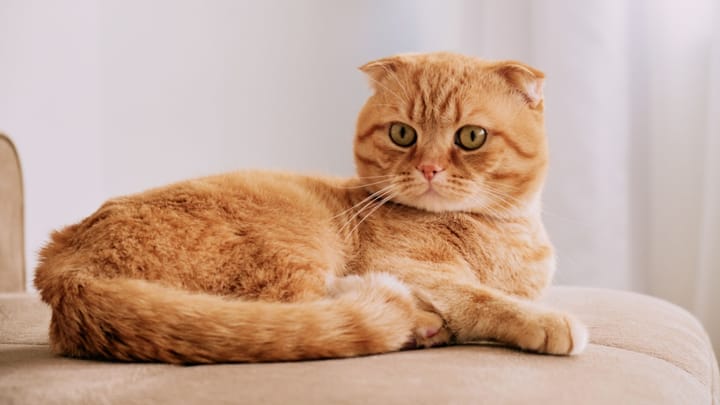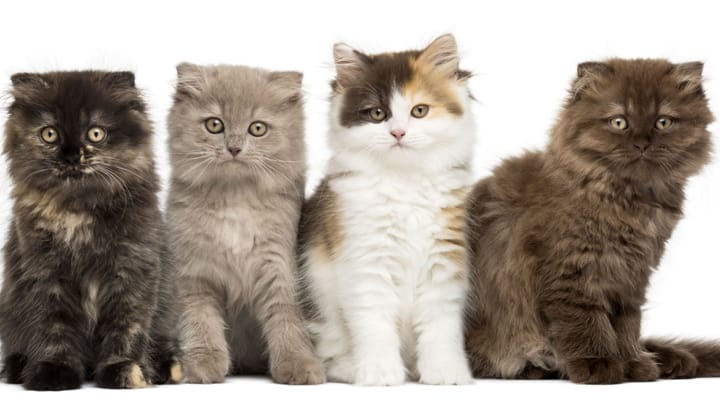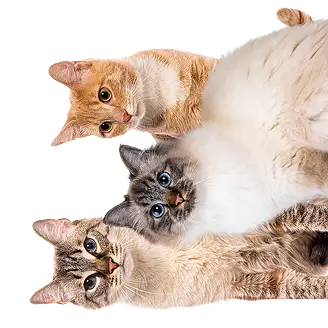Highland Fold
Other name: Highland straight


The Scottish and Highland breeds both originate from Scotland. The Highland is simply a long-haired Scottish with ears that either fold-forward or are straight. In competitions, these are two distinct categories.The Highland is medium-sized with a rather rounded body and is known to be easy-going, both with humans and other animals, as well as generally being a healthy breed.
|
Life expectancy |
The Highland Fold has a life expectancy of between 13 and 15 years |
|
Temperament |
|
|
Adult size |
Female
Between 12 and 14 in
Male
Between 12 and 14 in
|
|
Adult weight |
Female
Between 7 and 11 lb
Male
Between 9 and 13 lb
|
|
Coat colour
Black / seal, blue / grey-slate, chocolate, lilac, cinnamon, fawn, red, white |
Black Brown White Blue Red |
|
Type of coat
Mid-length, dense and silky |
Long |
|
Eye colour
Blue, aquamarine, ice blue, green, golden yellow All eye colours are accepted but they must match the coat. |
Blue
Green
Yellow
|
|
Purchase price |
The Highland Fold costs between £400 and £1000 |
Folds with white coats have long been thought to have a propensity for deafness, but this deficiency is related to the colour of the coat and not to the shape of the ears. It was also wrongly thought that the Fold shape of the ears made them prone to parasites.
More details about the Highland Fold
Highland Fold: Origins and history
The history of the breed originates from a Scottish farm and the birth, in 1961, of a cat named Susie, with ears bent forward. William and Mary Ross bought one of the female kittens from this cat’s litter, whom they call Snook. They decided to have Snook reproduced in such a way as to fix the folded ears trait, which turned out to be a dominant gene. Since this gene is at the origin of hereditary diseases, breeding is carried out in the safest possible way whilst maintaining the particularity of folded ears.
Physical characteristics of the Highland Fold
Semi-cobby, this cat has a solid bone structure and a powerful musculature. The fur is dense, silky and forms a collar around the neck. The head is round, with accentuated cheeks, emphasising the impression of roundness. All colours of coat are allowed but the colour of the eyes must match that of the coat.
Unlike the Fold variety whose ears fold forwards due to a genetic mutation, the Straight variety has very straight ears.
The Highland is kind and as long as they are given enough time to play, they adapt well to all kinds of lifestyles.
Highland Fold: Characteristics
Highland Fold: Behaviour
Breed compatibility Highland Fold
Highland Fold: Purchase price
On average, the price of a Highland kitten is between £400 and £1000, the price often varies according to the lineage, the breeder, the age or even the sex. For the monthly budget, it will cost on average £25/month to provide for their needs, by providing a quality diet and ensuring their good health.
Highland Fold: Shedding
Light
This breed doesn’t lose much hair except for in Spring when they can shed some of their undercoat.
Highland Fold: Grooming
A weekly brushing will suffice except during the moulting periods when daily brushing is recommended.
Highland Fold: Health
This breed has a fairly typical life expectancy for a cat, between 13 and 15 years with significant differences between individuals depending on lifestyles.
With a dense undercoat, they cope better in the cold than in the heat.
Ensuring they play every day is a good way to prevent weight-gain.
Generally a rather robust breed, they can still succumb to the same illnesses as other cats. If your cat has access to the outside, it is recommended that they be vaccinated against infectious diseases such as Coryza, Leucose, Rage and Typhus, according to your vet’s opinion.
- The Straight variety does not suffer from any hereditary diseases.
- The "Fold" variety may be affected by hereditary diseases due to the presence of the "Fold" gene:
- Osteochondrodysplasia
- PKD
- HCM
Osteochondrodysplasia causes bone and joint diseases resulting in rigidity of the lower spine and tail, lameness can be significant and can, in its most severe form, lead to paralysis. The Fold gene, more precisely named Folded ear (Fd), is responsible for this affliction. It is for this reason that reproduction between two Fold cats is prohibited. Nevertheless, a cross between a Straight and a Fold can also produce a kitten carrying the disease. There is still a real risk even with a heterozygous cat. It is only through careful selection of your cat or kitten as well as regular check ups with the vet that you can guarantee that your cat won’t suffer from this disease.
PKD, polycystic kidney disease, results in renal problems which causes different symptoms. It affects different breeds of cats, including the British and the Persian, breeds used to produce the Scottish. There is no specific treatment for this disease. It is therefore strongly recommended to have the breeding animals genetically tested to ensure that they do not carry PKD.
HCM or Feline Hypertrophic Cardiomyopathy also affects several breeds of cats, including the British and the Persian. It produces a gradual thickening of the cardiac muscle tissue that causes breathing difficulties. Again, affected cats should not be used for breeding.
The average number of kittens per litter is 3.36.
Since the Fold gene can lead to the undesirable consequences described above, it is forbidden to reproduce two Fold individuals. One of the parents must be straight-eared, however the Fold gene is a dominant gene. That being said this combination of Straight and Fold does not guarantee that individuals will not be affected by the Osteochondrodysplasia.
Improving the genepool is the main objective of breeders who hope to reduce the risk of diseases linked to the Fold gene. Something they hope to achieve through rigorous breeding controls.
The only authorised crossing with the Highland are: Scottish / Highland Fold & Scottish / Highland Straight; Scottish / Highland & British (Shorthair / Longhair) and Scottish / Highland & American Shorthair (since 2015).







